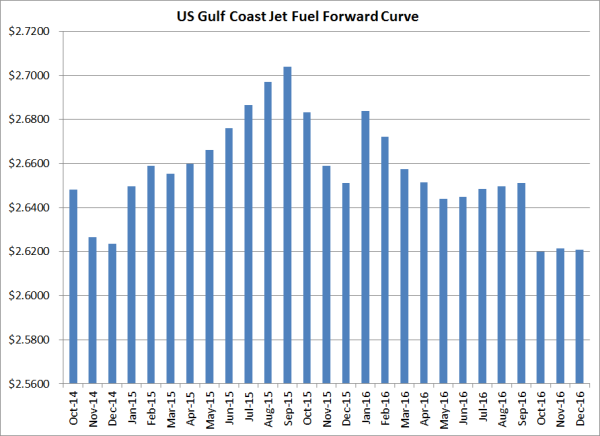Are Airlines Changing Fuel Hedging Strategies in 2014 and Beyond?
In recent weeks, there have been several articles written on the state of airline hedging in the US, Europe, Middle East and Asia. So, what is the global consensus regarding airline fuel hedging in 2014 and beyond?

Asia
According to a Reuters article, Asia Airlines Raise Hedging Volumes on Oil Price Fall, "Airlines in Asia are stepping up jet fuel hedge volumes after oil prices fell below $100 a barrel this month, with some locking in fuel purchases as far out as 2016, suggesting airlines see oil prices bottoming." While we are not seeing Asian airlines hedging aggressively further out the curve i.e. 2016, we are certainly seeing many Asian airlines taking a much more proactive approach to hedging in terms of updating their policies, procedures and strategies as well as making sure that their relevant staff have adequate training and resources.
Middle East
In the Middle East, a recent article in Gulf News, Fuel Hedging Policies Unchanged at Emirates, Etihad as Oil Prices Fall, it appears that airline fuel hedging in the region remains unchanged with two of the major carriers, Etihad and Emirates, stating that they are sticking with their long term strategies, which in the case of Emirates, is not hedging their fuel price risk. That being said, based on what we learned at fuel hedging workshop we recently facilitated for the Arab Air Carriers Organization, it is safe to say that many airlines in the region who have previously not engaged in fuel hedging will be doing so in the coming months and years.
Europe
A recent article from Bloomberg, European Airlines Cut Jet Fuel Hedging as Prices Fall, stated that, "Three of the five largest carriers tracked by Bloomberg cut their protection against price increases for this year, while two kept it the same." The article further stated, "Air France-KLM hedged 63 percent of its estimated $2.4 billion fuel bill for the third quarter, compared with 74 percent of its $2.5 billion consumption a year earlier, data from the company show. That was the biggest percentage decrease among the largest European carriers, and it was the only company to reduce hedging for all periods when it reported half-year earnings on July 25."
On the other hand, according to a recent update from Reuters, Jet Fuel Hedging Positions of European Airlines, one could certainly argue that many European airlines are hedged quite aggressively, especially when compared to their North American counterparts. However, tables of this sort often aren't as informative as they appear on the surface as they don't differentiate between different strategies. For example, an airline who is 80% for 2015 with fixed price swaps has a very different risk profile than an airline 80% hedged for 2015 with call options.
North America
What's happening with North American carriers? According to this recent article from Argus, US Airlines Are Taking the Hedge Off on Jet Fuel, "The world’s largest airline, newly merged American Airlines, said it had sold off its hedging contracts by the end of the second quarter, an expected move as merger partner US Airways had gone without hedging since 2008." While American is definitely adopting the US Airlines strategy of not hedging, we know that at least two North American carriers are/will be expanding their fuel hedging programs in the coming months. Last but not least, for those who have yet to hear about it, Delta, far from shying away from hedging, took it a step further by purchasing a refinery in Pennsylvania (see Delta Subsidiary to Acquire Trainer Refinery Complex for more details).
Consensus
Back to our initial question, what is the consensus regarding fuel hedging among airlines around the world? Clearly there isn't one, which is in line with our philosophy that each and every airline need to determine the best approach for their specific airline, whether that is a very aggressive, long-term hedging program, none at all, or somewhere in between the two extremes.
According to one of the analysts quoted in the Reuters, "It's better for airlines to do a consistent fixed percentage of regular hedging rather than capturing ups and downs as they usually lose big money because of this." While there is something to be said for this view, it is incorrect that two (the two being fixed percentage/regular hedging and capturing ups and downs) can't co-exist as it is certainly possible to hedge certain percentages consistently while utilizing strategies that will allow one to capture opportunities in the market. As stated in the Bloomberg article, “Lufthansa has a structural policy that covers jet fuel buying for the next two years,” Christoph Meier, a Frankfurt-based spokesman for the airline, said by phone today. “We don’t adjust our hedging policy based on any short or mid-term price movements.” While we generally agree that it is best not to modify a hedging policy based on market conditions, most airlines should adopt a hedging policy which allows them to modify existing positions if market conditions present opportunities to do, a concept often referred to as dynamic hedging. For more on this topic see The Case For Employing A Dynamic Fuel Hedging Program.
Study & Conference
On a couple related notes, in the coming weeks we will be beginning our research for the third edition of our report, The State of Airline Fuel Hedging & Risk Management. We are also in the early stages of organziing the 2015 Airline Treasury, Risk Management & Hedging Forum which is tenatively scheduled to take place May 19-20 in London. If you would like to participate in the study or the forum, please contact us. Last but not least, Mike Corley will be leading a session on airline fuel hedging at the Airline Economics conference taking place November 3-5 in Hong Kong.
